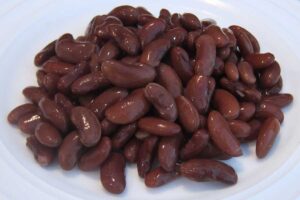Blacks beans. Kidney Beans. Pinto beans. Chickpeas. Navy beans. Lentils. Green peas. These luscious legumes (and more) figure prominently in the daily diet of the healthiest, longest lived people on the planet. They are a mainstay of a whole foods plant based diet.
Here are just a few of the reasons why I love them:
 A one-cup serving offers 14-18 grams of high quality protein.
A one-cup serving offers 14-18 grams of high quality protein.- They’re high in fiber which helps dilute the caloric density of a meal, creates a sense of fullness, and dampens the appetite. Higher fiber consumption is associated with lower cancer rates in the rectum and colon and is linked to healthier gut flora.
- They’re loaded with vitamins and phytonutrients. (The darker the color, the more the nutrients.)
- They have a low glycemic index – i.e., they slow the rate at which glucose is absorbed in the bloodstream. As such, they’re especially good for persons with diabetes, metabolic syndrome, and/or weight management issues.
- They’re naturally low in cholesterol and fat.
- There are lots and lots of delicious ways to prepare beans leveraging cuisines from all over the world!
Dr. Michael Greger of NutritionFacts.org tells us that legumes are the most important predictor of survival of older people globally.
Despite their impressive credentials, beans have come under attack by some nutritional consultants. Why? Beans contain lectins which provide a defense against microorganisms, pests, and insects. Lectins enable raw beans to pass through an animal’s digestive system intact, thereby enabling it to germinate in the soil when eliminated. As such, these consultants argue that beans give our digestive system a rough go of it and should be avoided.
Here’s where that logic goes wrong:
- First: We don’t eat beans raw. They’re hard as rocks and might even break our teeth! And they wouldn’t be tasty even if we managed to chomp them down.
- Second: Beans lose their lectins when properly prepared. One method calls for soaking the beans for at least 5 hours, rinsing them off, and then boiling for 30-45 minutes. If lacking time to soak the beans, they can be cooked in a pressure cooker for 45-60 minutes.
In other words: If you cook beans to the point where they’d be considered edible, it should be more than sufficient to destroy the adverse activity of lectins. For more information, see How to Avoid Lectin Poisoning on NutritionFacts.org.